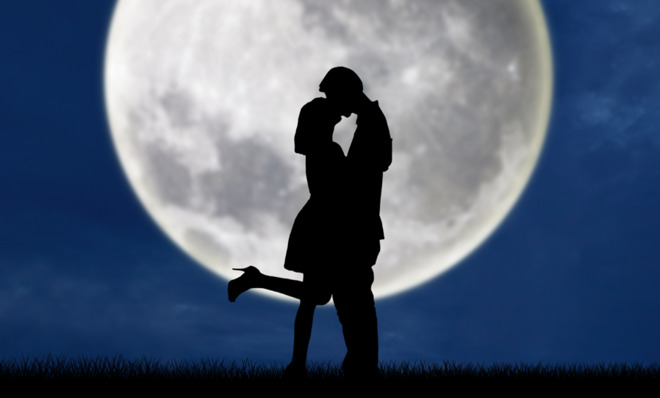Stanford's oldest kissing tradition is a public health problem
Once-quaint Full Moon on the Quad is a bastion for mononucleosis and other illnesses

A free daily email with the biggest news stories of the day – and the best features from TheWeek.com
You are now subscribed
Your newsletter sign-up was successful
While Stanford is known for its many nude traditions, students expose themselves to far more when it comes to a (generally) fully-clothed ritual. An article in the New York Times reveals that a once-quaint kissing tradition has become a campus public health issue.
Full Moon on the Quad is a classic Stanford event where freshmen and seniors rush onto the Quad and kiss each other at the stroke of midnight. It began in the 19th Century "as a chaste tradition during which senior men and freshmen women would exchange roses and kisses," writes Jana Persky in the Stanford Daily.
Now, the kisses aren't delicately exchanged so much as drunkenly planted as fast, and with as many people, as possible. In 2010, then-Sophomore Class President Steven Greitzer told the Stanford Daily the event had become "kind of a chaotic makeout session."
The Week
Escape your echo chamber. Get the facts behind the news, plus analysis from multiple perspectives.

Sign up for The Week's Free Newsletters
From our morning news briefing to a weekly Good News Newsletter, get the best of The Week delivered directly to your inbox.
From our morning news briefing to a weekly Good News Newsletter, get the best of The Week delivered directly to your inbox.
Dripping in social lubricant, freshmen and seniors smack as many lips as possible. Freshman Caroline Doyle told the New York Times, "My friend and I decided to go for 100. We split it down the middle.
The Tree, the Stanford marching band's mascot, gets kissed by more people that night than most do in a lifetime. Calvin Studebaker, proudly reported to the New York Times he had kissed 566 students, which he's "pretty sure is the male tree record." When a female student is the Tree, the record is upward of 1,000.
But unsurprising, with all these students swapping spit, some major germs and infections are exchanged, as well. Now Stanford administrators are trying to control the fast spread of mononucleosis and the flu that appear in the days following Full Moon on the Quad.
Donald G. McNeil Jr. at the New York Times characterized it as an example of "mass-gathering medicine," an area of public health devoted to issues arising from large communal activities. He compared it to "Saudi Arabia's multimillion-dollar efforts to keep the annual pilgrimage to Mecca as epidemic-free as possible."
A free daily email with the biggest news stories of the day – and the best features from TheWeek.com
The school has contemplated and attempted banning the event, but as we all know, trying to stop drunk college students from making out with each other is a Sisyphean task. The student health center director Dr. Ira M. Friedman told the New York Times, "We try to create an environment in which they don't feel they must participate in the exchange of oral secretions."
But oral secretions are as much a part of the college experience as red Solo cups, so students participate in Full Moon en masse. Enter "peer health educators" to teach freshman the "no glove, no love" approach: If they're going to kiss, kiss safely. Former educator Michelle Lee Mederos told the New York Times:
We tell them, 'Don't floss beforehand, don't brush, don't do anything that could create microabrasions in your gum for germs to get in.' And we have a table where we offer mints and little Dixxie cups of mouthwash. [New York
There are even dental dams available, though using those for kissing is like wear a safety helmet in a car.
Still, you've got to admire Stanford for taking so many precautions instead of trying to fight the inevitable. All the campus can do is hope for the best.
As Senior Neil Luu told the Stanford Daily, "Full Moon on the Quad is always an interesting experience for everyone," adding. "As an RA, though, I hope there aren't too many cases of mono."
Emily Shire is chief researcher for The Week magazine. She has written about pop culture, religion, and women and gender issues at publications including Slate, The Forward, and Jewcy.
-
 How the FCC’s ‘equal time’ rule works
How the FCC’s ‘equal time’ rule worksIn the Spotlight The law is at the heart of the Colbert-CBS conflict
-
 What is the endgame in the DHS shutdown?
What is the endgame in the DHS shutdown?Today’s Big Question Democrats want to rein in ICE’s immigration crackdown
-
 ‘Poor time management isn’t just an inconvenience’
‘Poor time management isn’t just an inconvenience’Instant Opinion Opinion, comment and editorials of the day